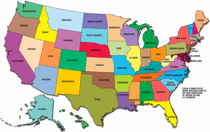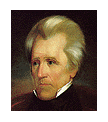
US Presidents (POTUS)
The American President is widely considered to be the most powerful person on the earth, and is usually one of the world's best-known public figures.
 Andrew
Jackson
Andrew
Jackson
7th President of the United States
(March 4, 1829 to March 3, 1837)
Nicknames:
-
"King Andrew"
-
"Old Hickory," Allegedly given to him by his soldiers for being as "tough as old hickory."
-
"Sharp Knife," Given to him by the Creek Indians whom he fought in 1814
Andrew Jackson
Born: March 15, 1767, in Waxhaw, South Carolina
Died: June 8, 1845, at the Hermitage in Nashville, Tennessee
Father: Andrew Jackson
Mother: Elizabeth Hutchinson Jackson
Married: Rachel Donelson Robards (1767-1828), in August 1791
and in a second ceremony on January 17, 1794
Children: Andrew Jackson, Jr. (adopted)
Religion: Presbyterian
Education: No formal education
Occupation: Lawyer, soldier
Political Party: Democratic
Other Government Positions:
- Member of US House of Representatives, 1796-97
- United States Senator, 1797-98
- Justice on Tennessee Supreme Court, 1798-1804
- Governor of the Florida Territory, 1821
- United States Senator, 1823-25
Andrew Jackson Biography
More nearly than any of his predecessors, Andrew Jackson was elected
by popular vote; as President he sought to act as the direct representative
of the common man.
Born in a backwoods settlement in the Carolinas in 1767, he received
sporadic education. But in his late teens he read law for about two
years, and he became an outstanding young lawyer in Tennessee. Fiercely
jealous of his honor, he engaged in brawls, and in a duel killed a man
who cast an unjustified slur on his wife Rachel.
Jackson prospered sufficiently to buy slaves and to build a mansion,
the Hermitage, near Nashville. He was the first man elected from Tennessee
to the House of Representatives, and he served briefly in the Senate.
A major general in the War of 1812, Jackson became a national hero when
he defeated the British at New Orleans.
In 1824 some state political factions rallied around Jackson; by 1828
enough had joined "Old Hickory" to win numerous state elections and
control of the Federal administration in Washington.
In his first Annual Message to Congress, Jackson recommended eliminating
the Electoral College. He also tried to democratize Federal office holding.
Already state machines were being built on patronage, and a New York
Senator openly proclaimed "that to the victors belong the spoils. .
. . "
Jackson took a milder view. Decrying officeholders who seemed to enjoy
life tenure, he believed Government duties could be "so plain and simple"
that offices should rotate among deserving applicants.
As national politics polarized around Jackson and his opposition, two
parties grew out of the old Republican Party--the Democratic Republicans,
or Democrats, adhering to Jackson; and the National Republicans, or
Whigs, opposing him.
Henry Clay, Daniel Webster, and other Whig leaders proclaimed themselves
defenders of popular liberties against the usurpation of Jackson. Hostile
cartoonists portrayed him as King Andrew I.
Behind their accusations lay the fact that Jackson, unlike previous
Presidents, did not defer to Congress in policy-making but used his
power of the veto and his party leadership to assume command.
The greatest party battle centered around the Second Bank of the United
States, a private corporation but virtually a Government-sponsored monopoly.
When Jackson appeared hostile toward it, the Bank threw its power against
him.
Clay and Webster, who had acted as attorneys for the Bank, led the fight
for its recharter in Congress. "The bank," Jackson told Martin Van Buren,
"is trying to kill me, but I will kill it!" Jackson, in vetoing the
recharter bill, charged the Bank with undue economic privilege.
His views won approval from the American electorate; in 1832 he polled
more than 56 percent of the popular vote and almost five times as many
electoral votes as Clay.
Jackson met head-on the challenge of John C. Calhoun, leader of forces
trying to rid themselves of a high protective tariff.
When South Carolina undertook to nullify the tariff, Jackson ordered
armed forces to Charleston and privately threatened to hang Calhoun.
Violence seemed imminent until Clay negotiated a compromise: tariffs
were lowered and South Carolina dropped nullification.
In January of 1832, while the President was dining with friends at the
White House, someone whispered to him that the Senate had rejected the
nomination of Martin Van Buren as Minister to England. Jackson jumped
to his feet and exclaimed, "By the Eternal! I'll smash them!" So he
did. His favorite, Van Buren, became Vice President, and succeeded to
the Presidency when "Old Hickory" retired to the Hermitage, where he
died in June 1845.
Source: http://www.whitehouse.gov/

US Presidents: Life & Accomplishments



